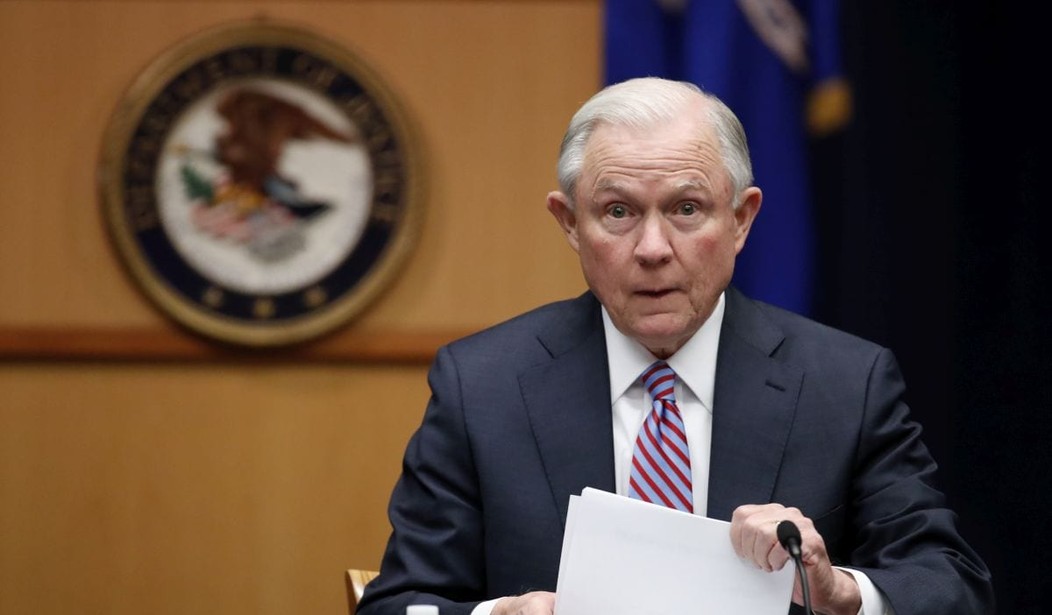I’ve written about the overreach of the federal judiciary in this space often — here and here — so it’s great to finally see the attorney general, Jeff Sessions, doing something about it. At this point, it’s just a lawsuit, but at least it’s a warning shot over the heads not only of rogue judges but of rogue states like California who seem hell-bent on forcing a constitutional crisis:
Attorney General Jeff Sessions on Saturday slammed “activist judges,” whom he accused of overreaching and paralyzing the government by shutting down Trump-era policies they object to via nationwide injunctions. At a Federalist Society event at Georgetown University, Sessions blasted judges who have shut down controversial Trump-era policies such as denying funding for so-called “sanctuary cities” and repealing the Deferred Action for Childhood Arrivals (DACA) program.
“The court is not superior; the court does not get to have the final word in every dispute, give me a break,” he said.
He said the vehicle of choice for “activist judges” is nationwide injunctions — orders that block the federal government from enforcing a law or policy across the entire country. “It would be fitting to call them nonparty injunctions or limitless injunctions, since they bind all of America and grant relief to those who are not parties to the case,” he said.
The words in bold above are crucial: the courts do not, in fact, have the final say in every political dispute; if they did, we would be ruled by little more than a berobed, unelected oligarchy. Congress, in fact, has constitutional oversight of every federal court in the land except the Supreme Court, and could abolish the lot of them tomorrow if it so wishes.
As for California and the Democrats, I wrote in a recent American Greatness column:
The very least we should expect from one of the two major political parties is a minimal pretense of upholding the laws of the United States. After all, that is what our elected representatives and judges swear to do when they take office. And yet, as things stand now, this isn’t a sure bet. As President Trump attempts to reassert American national sovereignty through the simple expedient of enforcing current immigration laws, the Democratic Party has decided to thwart him at every turn, primarily via its control of the lesser federal judiciary. It’s a move they’ll come to regret.
Take for example, the recent ruling by two federal judges that Trump has no right to countermand an executive order issued by his predecessor regarding the lifelong illegal aliens and non-American citizens the Left has touchingly decided to sentimentalize as “Dreamers.”
The first “order”—as if a federal judge, whose entire job both in its creation and in its continuance, is dependent on Congress’s power under Article III, Section 1 of the Constitution, has any authority to interfere with the proper functioning of the executive branch—blocked the president from ending the “DACA” program, which had been conjured into existence via Barack Obama’s pen and phone back in the founding prehistory of 2012. The second order, issued just the other day, took issue with Trump’s reasoning and motive behind his executively ordered end to the executively ordered program; “arbitrary and capricious,” opined the solon regarding Attorney General Jeff Session’s defense of the order.
The administration’s proper response to this latest judicial power grab should be to echo Andrew Jackson’s possibly apocryphal but apposite retort to the chief justice back in 1832: “John Marshall has made his decision; now let him enforce it!” (Although I prefer Alec Baldwin’s rejoinder to Ed Harris in “Glengarry, Glen Ross“.)
But, as part of the “resistance,” federal judges have tried to block the Trump administration’s policies at every turn:
According to Sessions, President Donald Trump has been hit with 22 such injunctions since he took office, on issues such as transgender people in the military, DACA, sanctuary cities and the travel ban. He complained that the practice meant that one federal judge out of 600 can shut down a federal policy across the U.S., even if others agree with the government. “It’s a question often of pure, raw power — who decides?” he said, accusing judges of turning themselves into “super-legislators.”
Who decides? The answer is right there in Article III, if only Sessions and the Congress would care to have a look. Meanwhile, as we’ve seen, some Democrat elected officials have gotten into the act, and now are actively working to interfere with the proper functioning of the federal government:
The long-overdue action is also a direct response to Oakland Mayor Libby Schaaf, who recently interposed herself between the illegal-alien community of the Bay Area and the U.S. Immigration and Customs Enforcement service (ICE). Learning of a pending ICE raid, Schaaf tipped off a prized constituency in advance, not once but twice: first in a statement and then a news conference the following day. As a result, federal agents managed to arrest only 150 aliens (and at least half of those convicted criminals), but 864 more threats to public safety escaped the dragnet. In Schaaf’s wake, California Attorney General Xavier Becerra also sued the Trump Administration over a minor retaliatory action in response to the Golden State’s rogue behavior. In question was an administration decision to withhold a small law-enforcement grant to the state. Becerra’s request was, however, denied by a federal judge.
The law is clear: state and local officials need not actively cooperate with ICE, but neither are they allowed to frustrate it. Sessions’ suit is just a first step toward reining in the “resistance” before it becomes an actual insurgency.








Join the conversation as a VIP Member